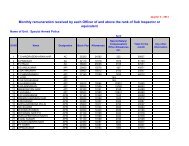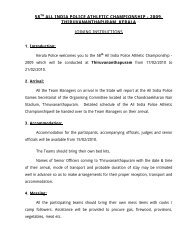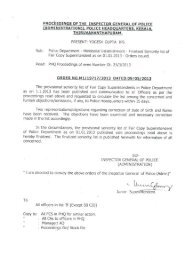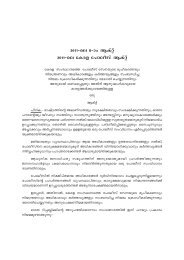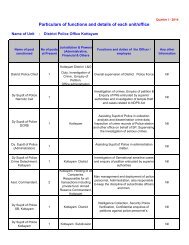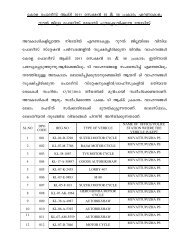Janamaithri Suraksha Project - Kerala Police
Janamaithri Suraksha Project - Kerala Police
Janamaithri Suraksha Project - Kerala Police
Create successful ePaper yourself
Turn your PDF publications into a flip-book with our unique Google optimized e-Paper software.
March 2005, Sri Oommen Chandy (UDF) was the incumbent Chief Minister following the resignation<br />
of Sri Antony in the previous year. 2005-06 was the election year for the 12th Assembly. The decision<br />
of the government whether to introduce community policing might have been weighed against<br />
other pressing electoral agendas lying before.<br />
In the 12th Assembly elections in 2006, the LDF got the mandate to form the government<br />
defeating the UDF. Sri V. S. Achutanandan was sworn in as the Chief Minister. The police leadership<br />
pushed the agenda before the newly elected government. Buoyant with the fresh mandate, the new<br />
government was convinced to implement the <strong>Janamaithri</strong> <strong>Suraksha</strong> <strong>Project</strong> (JSP) as the overarching<br />
community policing initiative of the state police. The window of opportunity (policy window) opened<br />
when three separate streams of problem, solution and politics come together in August 2007. It was<br />
then that the JSP was launched officially in the state. Government Orders were issued incorporating<br />
the Standard Operating Procedure for the JS, budgetary allocations were provided, and a State Level<br />
Nodal Officer was appointed for training, monitoring and evaluation. Pilot instead of state-wide<br />
implementation was preferred as a policy. The policy got further instituonalised when the Sri Oommen<br />
Chandy was sworn in as the Chief Minister in May 2011. The new government having realized the<br />
constraints of manpower increased the sanctioned strength of each <strong>Janamaithri</strong> police agenda before<br />
the new political leadership in 2006 as well as other stake holders.<br />
1.4 Triangulation of Theories and Praxis<br />
Having discussed the policy concerns, the interpretation of data has been made keeping in<br />
mind the theories and praxis that have been validated during the field study. The parameters under<br />
each category, pre-implementation, implementation and impact, were evaluated on the basis of<br />
the key words captured in the transcript of the respondent group.<br />
1.4.1 Pre-implementation Dynamics<br />
a) Political Will<br />
A shorthand definition of political will is: the commitment of actors to undertake actions to<br />
achieve a set of objective and to sustain the costs of those actions over time. It will be interesting<br />
to trace out the long preparatory journey of ‘<strong>Janamaithri</strong> <strong>Suraksha</strong> <strong>Project</strong>’ (JSP) before it got the<br />
approval a major public policy. The community policing scheme waited for long three years from<br />
2005 to 2008 before becoming an avowed policy of the government. The ‘window of opportunity’<br />
(Kingdon,1995) opened in the year 2008 when the policy entrepreneurs (in this case the police<br />
leadership) played a crucial role in the intervening period to steer all the three streams, the problem,<br />
solutions and politics, pass through the ‘policy window’ (Ayyar, 2009).<br />
b) Misconceptions in public mind<br />
Misconceptions in Public mind means the lenses through which the general populace overread<br />
or under-read the police attitude and activities as nothing to their interest. More is misconceptions<br />
in public mind about police more is the gap between police and public. Tackling the mind set of<br />
police as well as public is one of the major tasks in the pre-implementation phase. In the year 2000,<br />
<strong>Kerala</strong> <strong>Police</strong> drafted a similar scheme and trained its officers. But it was opposed on the<br />
misconceived idea that community will share the burden of police work. It was misinterpreted that<br />
police is going to introduce a system of policing with the help of the community by which policing<br />
will be done by the community itself. So the program could not take off (Jacob). A sustained<br />
campaign by <strong>Kerala</strong> <strong>Police</strong> to allay the misconceptions in the minds of the public and to sell the<br />
idea to the public that they become partners with the police to prevent crime, maintain order in the<br />
neighbourhood ultimately paid dividend with the success of <strong>Janamaithri</strong>.<br />
c) Predecessor-Successor Syndrome<br />
Predecessor/Successor Syndrome was a major obstacle at the pre take off stage of the CP<br />
Initiatives. When an incumbent joins a new post and succeeds his predecessor, he shows a general<br />
tendency not to follow the legacy and do something new. In the process, a brilliant initiative of the predecessor<br />
is given a premature obituary. However, with institutional arrangements in place, a programme or initiative<br />
continues uninterrupted irrespective of the incumbents. Here the system takes care of personal aberrations.<br />
9



